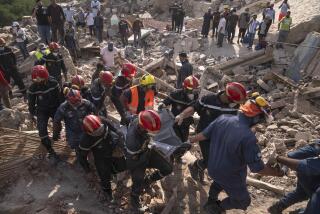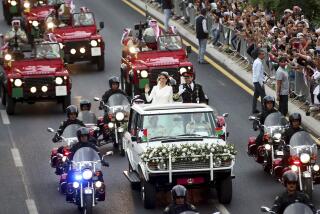Profile : Morocco’s Hassan Survives Africa’s Political Minefield : * His finely tuned instincts have kept him in power for more than 30 years. Friend and foe alike marvel at his diplomatic pirouette during the Gulf crisis.
- Share via
RABAT, Morocco — It was a simple gesture of humility on the part of a monarch who claims direct descent from the Prophet Mohammed and who is heralded in Moroccan newspapers as “His Majesty Hassan II, Commander of the Faithful, The Savior and The Unifier.”
At a recent conference of Muslim religious scholars he hosted here, Morocco’s King Hassan II, who celebrated his 30th year in power in February, sat reverently on the floor clutching his prayer beads as the invited guests, wise men of Islam from the world around, pronounced on the moral issues of the times.
But the televised “religious court” was also a typically savvy political act by Hassan, 61, scion of the four-century-old Alawite dynasty and one of the great survivors of the African political scene.
Honoring and feting religious leaders is one of the ways the Moroccan leader has managed to avoid a strong challenge from the Islamic fundamentalist movements that plague neighboring governments in the North African Maghreb region and other predominantly Muslim states.
“Did you see the way that he sat on the floor--below the level of the speakers?” asked a senior government official. “It may seem like a tiny detail, but it is one of the reasons fundamentalism is not a big factor here.”
Through guile, intelligence and a seemingly unerring ability to know when to bend and when to bear down--human rights critics say “brutalize”--debonair Hassan has escaped assassination attempts, leftist uprisings, attempted coups and economic riots to become the longest-reigning monarch in Africa.
His most recent tightrope act, applauded for its virtuosity by friend and foe alike, came during the Persian Gulf crisis.
Despite Moroccans’ largely sympathetic view of Iraq, which they saw as an underdog against the powerful West and its rich Gulf Arab allies, Hassan was the only North African leader, besides Egyptian President Hosni Mubarak, to send military forces to Saudi Arabia.
The small, largely symbolic detachment of 1,300 troops--assigned to guard a major Saudi refinery--won Hassan the overflowing affection of the United States and its allies, including the oil-rich Gulf states. Officials interviewed here hope it will bring Morocco long-term economic bonuses, as well.
But in several speeches, delivered during the crisis, Hassan also described Iraqi President Saddam Hussein as his “dear Arab brother.” He ordered members of the Moroccan royal family to supervise collection of emergency supplies to the suffering Iraqi people. In one particularly ambidextrous speech, the king announced that his “mind” was with the allied coalition and Kuwait but that his “heart” was with Hussein and the people of Iraq.
In a rare show of confidence in his rule, the king also permitted five opposition parties and Muslim fundamentalists to stage a pro-Iraq demonstration in the streets of Rabat, the Moroccan capital and the seat of his throne. An estimated 200,000 demonstrators burned American, Israeli, British and French flags and carried enlarged photos of Hussein. The police kept to the sidelines. The largest rally in recent Moroccan history ended without incident.
After letting anti-war demonstrators blow off steam in Rabat, the king then banned another rally planned by the same groups for Casablanca.
When opposition leaders challenged him about the Moroccan troops in the Gulf, the king said they were not actually part of the allied coalition but were sent to Saudi Arabia as part of a separate agreement he had with King Fahd, one of several members of the Saudi Royal Family who has a vacation palace in Morocco. They would not, he insisted, take part in any attack on Iraqi territory.
As usual, the bridge-playing ruler had finessed all the players, including his partners. “It required some amazing political agility,” said an admiring diplomat, “but somehow the king came out of the war stronger than he went in.”
It was not the first time King Hassan, has successfully played a delicate, dangerous political game. In 1982, he hosted an Arab summit meeting in Fez where he managed, for the first time, to persuade all the leaders of the Arab world to agree on a peace plan that implicitly recognized Israel’s right to exist. The “Fez Plan” also called for the creation of a Palestinian state with Jerusalem as its capital.
Following up on the Fez meeting, the king shocked the Arab world in 1986 by hosting then-Israeli Prime Minister Shimon Peres. When Syria and other Arab countries protested, the king chided them for not having the “courage” to make either war or peace with Israel.
Hassan became king on Feb. 26, 1961, when his father, Mohammed V, died after what was expected to be a minor operation. The old sultan was beloved by his people for defying the French, who kept Morocco as a colonial protectorate until 1956. Few people gave Prince Hassan, who had a reputation as a playboy smitten by the allures of horse racing and nightclubs, much chance of sticking.
“When I ascended to the thrown,” Hassan reportedly told King Juan Carlos I of Spain in 1986, “people said I would not last more than six months.”
But the youthful new king moved quickly to establish Morocco as a democratic state with a constitutional monarchy. A law graduate of Bordeaux University, Hassan wrote the new country’s first constitution, which was ratified by popular referendum in 1962.
The constitution guaranteed freedom of speech, press and religion and created an elected, two-chamber legislature. But Hassan kept for himself the power to name the prime minister and army chief of staff, to dismiss the legislature at any time and to veto any legislative act that displeased him. Likewise, freedom of speech and press still had limits in Morocco, where government censors sometimes ban publications that are critical of the king.
In a recent celebrated example, a book by French leftist writer Gilles Perault was barred from the country after it allegedly maligned the monarch. The book, “Our Friend the King,” collected stories of human rights abuses under the 30-year Hassan reign. They include reports of the systematic torture and jailing, sometimes under extremely harsh conditions, of political prisoners.
Last month, the human rights organization Amnesty International reported more than 1,000 cases in Morocco of torture, disappearance and imprisonment without fair trial.
According to the reports, the king seems to reserve the main force of his wrath for those who plot against him and his rule.
In July, 1971, Hassan was the target of a military coup . The king was giving a gala party to celebrate his 42nd birthday when his seaside palace near Rabat was stormed by 1,400 rebel troops. More than 100 of his guests were killed but the king escaped, reportedly by hiding in a bathroom until troops crushed the rebellion.
A year later, in August, 1972, the king survived another attack when three air force fighter pilots attempted to shoot down the royal airplane as it was landing at Rabat. Although hit, the king’s plane managed to land. According to one report, Hassan succeeded in calling off the attacking jets by disguising his voice and announcing over the radio: “Stop firing. The tyrant is dead.”
After the two failed coups, Hassan had most of the plotters executed. However, the alleged mastermind, Gen. Mohammed Oufkir, was officially listed as having “committed suicide.”
Those conspirators who were not executed were jailed under often terrible conditions, according to human rights reports. In a widely criticized act, the king’s government ordered Oufkir’s widow, Fatima, the couple’s six children--none of whom was old enough to have played a role in the plot--and a cousin placed under a house arrest that lasted 18 years.
The Oufkir family was finally released in February, when the king included them in a group of prisoners, including leaders of a 1973 leftist uprising, who were granted royal amnesty on Throne Day marking his 30th year in power.
More recent examples of the harsh side of Hassan’s rule came after anti-government riots in Fez in December, in which at least 33 people were killed and hundreds more injured. After the riots, in which a large five-star hotel and several businesses were burned down, Amnesty International, the London-based human rights organization, reported that 850 people were sentenced to 15 years in jail.
The organization reported that defendants were tried and sentenced in mass hearings and said several of the accused complained of beating and torture at the hands of Moroccan authorities.
Whether news of such things reaches the level of Hassan and his family is hard to tell.
When not donning traditional garb and sitting at the feet of preaching mullahs, Hassan can often be found in golf outfits at one of his 11 fabulous castles, several of which are equipped with their own 18-hole courses that the king had designed by noted American golf architect Robert Trent Jones.
The huge family wealth contrasts starkly with the general poverty of overpopulated, high-unemployment Morocco.
But it has never stopped the seemingly imperturbable king from spending lavishly. To transport his royal entourage to a meeting of African leaders in La Baule, France, last year, Hassan requisitioned the Moroccan ferry boat that regularly plies between Tangier and Algeciras, Spain.
Criticizing the socialist governments of Egypt and Algeria in a 1964 interview with C.L. Sulzberger of the New York Times, Hassan said: “They want to impoverish the rich. We want to enrich the poor.”
With a per capita annual income of only $700 and one of the world’s largest foreign debts--based on its population of 25 million--Morocco is unlikely to enrich its poor any time soon. In fact, one of the main hopes of the government is that Morocco’s positive role in the Gulf crisis will encourage America and other lender countries to renegotiate the country’s $20-billion debt.
The struggling economy has not stopped Hassan from asking his people to share their wealth to build a huge mosque bearing his name in Casablanca, Morocco’s largest city and main business center.
The king launched the campaign to build the $500-million Hassan II Mosque in 1986. When finished sometime next year, the massive stone structure on the Atlantic Ocean coast will feature a powerful laser beam spotlight aimed at Mecca from atop its 700-foot minaret.
Every day, pro-royalist newspapers carry banner headlines seeking more contributions for the project: “Citizens, Men and Women, Respond to the Call of His Majesty. If You Have Not Already Done It, Contribute to the Construction of the Hassan II Mosque up to the Very Day of Its Inauguration.”
Biography Name: King Hassan II Position: 17th Sovereign of the Alaoutie dynasty. Age: 61 Personal: A law graduate of Bordeaux University, Hassan is the father of five children, two sons, including crown prince Sidi Mohammed, and three daughters. His wife, Lalla Latifa, is a commoner who does not carry the title of queen. In keeping with Moroccan tradition, she is officially described as “Mother of the Royal Children.” Quote: ‘When I ascended to the thrown people said I would not last more than six months,’ Hassan commenting on his rise to power in 1961.
More to Read
Sign up for Essential California
The most important California stories and recommendations in your inbox every morning.
You may occasionally receive promotional content from the Los Angeles Times.













